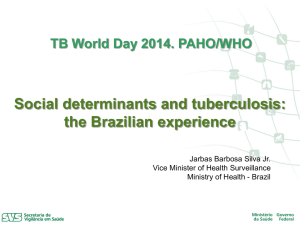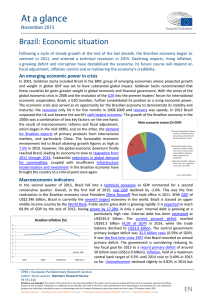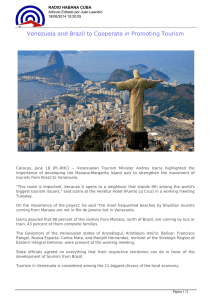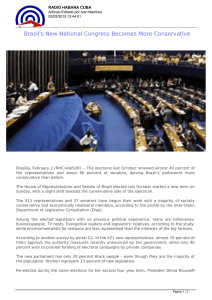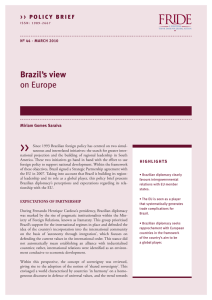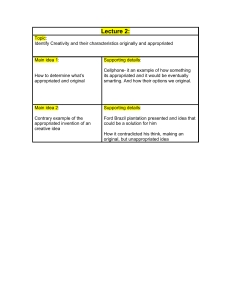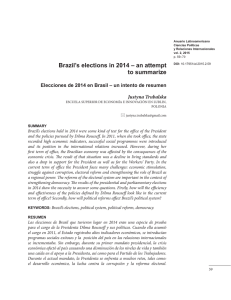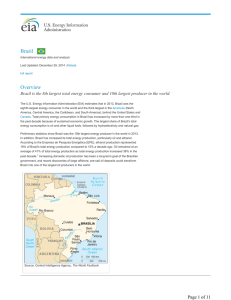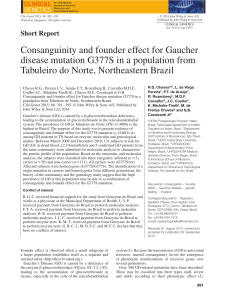Briefing European Parliamentary Research Service
Anuncio
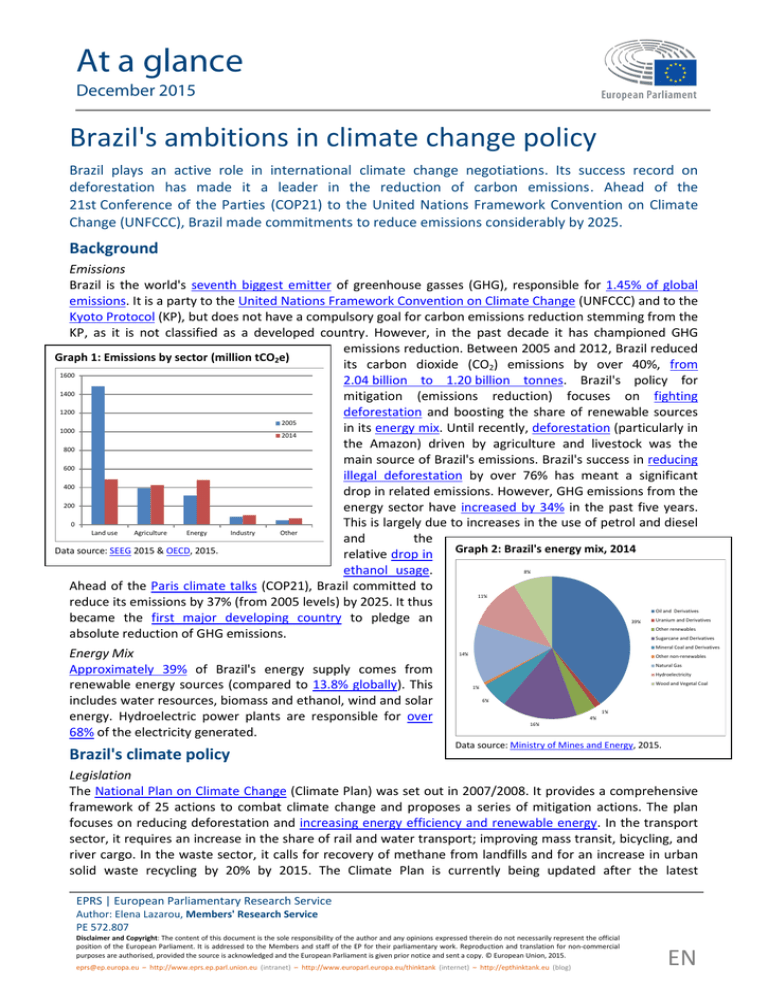
At a glance December 2015 Brazil's ambitions in climate change policy Brazil plays an active role in international climate change negotiations. Its success record on deforestation has made it a leader in the reduction of carbon emissions. Ahead of the 21st Conference of the Parties (COP21) to the United Nations Framework Convention on Climate Change (UNFCCC), Brazil made commitments to reduce emissions considerably by 2025. Background Emissions Brazil is the world's seventh biggest emitter of greenhouse gasses (GHG), responsible for 1.45% of global emissions. It is a party to the United Nations Framework Convention on Climate Change (UNFCCC) and to the Kyoto Protocol (KP), but does not have a compulsory goal for carbon emissions reduction stemming from the KP, as it is not classified as a developed country. However, in the past decade it has championed GHG emissions reduction. Between 2005 and 2012, Brazil reduced Graph 1: Emissions by sector (million tCO2e) its carbon dioxide (CO2) emissions by over 40%, from 1600 2.04 billion to 1.20 billion tonnes. Brazil's policy for 1400 mitigation (emissions reduction) focuses on fighting 1200 deforestation and boosting the share of renewable sources 2005 in its energy mix. Until recently, deforestation (particularly in 1000 2014 the Amazon) driven by agriculture and livestock was the 800 main source of Brazil's emissions. Brazil's success in reducing 600 illegal deforestation by over 76% has meant a significant 400 drop in related emissions. However, GHG emissions from the 200 energy sector have increased by 34% in the past five years. 0 This is largely due to increases in the use of petrol and diesel Land use Agriculture Energy Industry Other and the Graph 2: Brazil's energy mix, 2014 Data source: SEEG 2015 & OECD, 2015. relative drop in ethanol usage. Ahead of the Paris climate talks (COP21), Brazil committed to reduce its emissions by 37% (from 2005 levels) by 2025. It thus became the first major developing country to pledge an absolute reduction of GHG emissions. Energy Mix Approximately 39% of Brazil's energy supply comes from renewable energy sources (compared to 13.8% globally). This includes water resources, biomass and ethanol, wind and solar energy. Hydroelectric power plants are responsible for over 68% of the electricity generated. 8% 11% Oil and Derivatives 39% Uranium and Derivatives Other renewables Sugarcane and Derivatives Mineral Coal and Derivatives 14% Other non-renewables Natural Gas Hydroelectricity Wood and Vegetal Coal 1% 6% 1% 4% 16% Brazil's climate policy Data source: Ministry of Mines and Energy, 2015. Legislation The National Plan on Climate Change (Climate Plan) was set out in 2007/2008. It provides a comprehensive framework of 25 actions to combat climate change and proposes a series of mitigation actions. The plan focuses on reducing deforestation and increasing energy efficiency and renewable energy. In the transport sector, it requires an increase in the share of rail and water transport; improving mass transit, bicycling, and river cargo. In the waste sector, it calls for recovery of methane from landfills and for an increase in urban solid waste recycling by 20% by 2015. The Climate Plan is currently being updated after the latest EPRS | European Parliamentary Research Service Author: Elena Lazarou, Members' Research Service PE 572.807 Disclaimer and Copyright: The content of this document is the sole responsibility of the author and any opinions expressed therein do not necessarily represent the official position of the European Parliament. It is addressed to the Members and staff of the EP for their parliamentary work. Reproduction and translation for non-commercial purposes are authorised, provided the source is acknowledged and the European Parliament is given prior notice and sent a copy. © European Union, 2015. [email protected] – http://www.eprs.ep.parl.union.eu (intranet) – http://www.europarl.europa.eu/thinktank (internet) – http://epthinktank.eu (blog) EN EPRS Brazil's ambitions in climate change policy consultation process which ended in December 2014. The 2010 National Policy on Climate Change regulates articles of the Law relating to the Climate Plan, including actions for adaptation. Institutions Brazil's climate policy is set out and implemented by a wide range of institutions. The Inter-Ministerial Commission on Global Climate Change (CIMGC), created in 1998, brings together the relevant ministries for the implementation of the UNFCCC. Two additional institutions were created for the execution of the National Policy and the National Plan: the Inter-Ministerial Committee on Climate Change (CIM) and the Executive Group on Climate Change (GEx) respectively. Following the development of the Climate Plan, the government created the Fundo Clima (Climate Fund) financed by Petrobras royalties, as well as credit from the National Bank for Development (BNDES) and donations made by national and international organisations. The majority of the Fund's actions (85%) are directed towards mitigation. External climate policy Having hosted the 1992 Earth Summit and the 2012 Rio+20 UN Conference on Sustainable Development, Brazil has positioned itself as a significant actor in the international climate arena. External climate policy, including bilateral and multilateral commitments, falls under the Ministry of Foreign Affairs (Itamaraty), which shares external representation at multilateral negotiations with the Ministry of Science and Technology and the Ministry of the Environment. Brazil signed the Kyoto Protocol in 1998, defending the concept of 'common but differentiated responsibilities' whereby developed countries, because of their development stage and historical levels of greenhouse gas emissions, are expected to reach higher goals and commitments than those still developing. Since Brazil was classified as a developing country, it does not have a compulsory quantitative goal of for emissions reduction under the Kyoto Protocol. However, Brazil was a key player in the definition and adoption of the Clean Development Mechanism (CDM) in the Protocol (Article 12). Under the CDM, emission reduction projects in developing countries generate certified emission reduction (CER) credits that are traded on the Carbon Market among interested state and non-state actors, and which can be used by countries to fulfil their obligations. In this, Brazil was supported by the US, but not by the EU. Brazil also pursues a climate and energy agenda within the Brazil, Russia, India, China and South Africa (BRICS) group; support for the advancement of the aims of the UNFCCC was included in the Statement of the Sixth BRICS Summit under the Brazilian Presidency in 2014. Brazil and COP21 President Dilma Rousseff presented the Brazilian Intended Nationally Determined Contributions (INDCs) at the 70th General Assembly of the United Nations in September 2015. The Brazilian INDC goals include: reducing GHG emissions by 37% between 2005 and 2025 and by 43% by 2030; increasing the share of renewable sources in the total energy mix to 45% and ending illegal deforestation by 2030. The Brazilian INDCs are considered ambitious for a developing country, but some voices differ, arguing that Brazil is already close to attaining the stated contributions and that the proposal could have been more challenging. Brazil recently argued that developing countries' INDCs should be based on 'the extent of financial, technological and capacity-building support provided by the developed countries' and is pressing for more financing by developed industrialised countries, including through the Green Climate Fund established at COP16. It is supported in this position by the BASIC grouping (Brazil, South Africa, China and India), formed by these emerging economies in 2009 to act as a bloc in climate negotiations under the UNFCCC, promoting, among other things, G-77 interests. So far, all BASIC countries have made voluntary pledges with a view to 2020. Ahead of the Paris conference, Brazil proposed 'a dynamic interpretation of differentiation, whereby countries take on progressively more responsibilities in line with their economic development'. Brazil will focus its action on equity between developed and developing countries; on differentiation of treatment according to each country's financial and social capacity; and on larger and more long-term (beyond 2020) international financial support from developed countries. Brazil will also emphasise the need not only to reach a robust and efficient agreement, but also to ensure that commitments are implemented. The EU and Brazil were among the first actors to adopt the UNFCCC and the Kyoto Protocol. At the Fifth EU-Brazil Summit in 2011, the EU and Brazil highlighted the importance of enhancing cooperation on climate change at bilateral level and in the UNFCCC, and launched the EU-Brazil Climate Change Dialogue. Cooperation on environmental issues was first institutionalised in the 1992 EU-Brazil Framework Cooperation Agreement. The European Parliament Delegations to previous COP meetings have met with Members of the Brazilian legislature to discuss cooperation in climate negotiations, most recently at COP20 in Lima (2014). Members' Research Service Page 2 of 2


